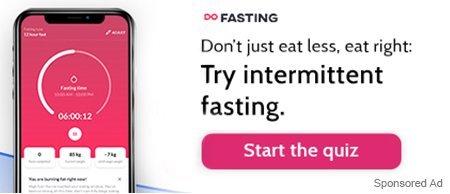Common Types of Intermittent Fasting | Benefits of Intermittent Fasting | Can Children do Intermittent Fasting | Can Teenagers do Intermittent Fasting | Intermittent Fasting for Young Adults | Intermittent Fasting for Adults | Intermittent Fasting for Older Adults
Many adults, parents and children have asked us, at what age can I do Intermittent Fasting? Intermittent fasting is a dietary approach where you alternate between fasting and eating windows. It has caught the imagination of people in recent times as a very effective tool to lose weight besides getting other health benefits as well. Many people, including celebrities, swear by intermittent fasting to improve health.
However, there is a pertinent question that needs to be answered. When should you start doing intermittent fasting? At what age is it okay to follow this strict dietary schedule? This article looks deep into this question and tries to answer it as best as scientific evidence allows.
At What Age Can I do Intermittent Fasting?
At any age you can intermittent fast, but there are lots of stipulations and complex variables that you need to be aware of depending on your age, health, sex, etc. It is extremely important to know these factors which we will cover in this article.
Some Common Types of Intermittent Fasting
Intermittent fasting has many schedules that one can follow. Some of the best-known and most popular ones are as follows.
16/8 Intermittent fasting: In 16/8 intermittent fasting, you fast for 16 straight hours and consume calories in the remaining 8-hour eating window of a 24–hour day.
5/2 Intermittent fasting: In 5/2 intermittent fasting, the dieter will eat normally for five days of the week but restrict his calorie intake to 500-600 calories on two non-consecutive days.
OMAD Fasting: This is a challenging IF schedule. In One Meal A Day Fasting, you will eat only one meal a day and fast for the remainder of the time. It is not recommended for beginners.

The Incredible Benefits of Intermittent Fasting
Intermittent fasting has some mind-blowing health benefits. For starters, it is directly associated with weight loss. Unlike traditional dieting methods, it achieves short- and long-term weight loss without restricting the intake of calories.
Following intermittent fasting will decrease insulin levels by 20-31%. This is good news for diabetic people. Intermittent fasting also lowers blood sugar levels by 3-6%.
When you do intermittent fasting, inflammation in the body reduces. Chronic inflammation directly contributes to diseases like high blood pressure and high blood sugar. Doing IF will help you to manage these chronic diseases.
Studies have found intermittent fasting reduces risk factors for heart disease like blood sugar, insulin resistance, blood triglycerides, LDL cholesterol, and insulin resistance. Your chances of heart disease reduce when you do intermittent fasting.
Intermittent fasting can help reduce the chances of cancer, as shown in animal studies. Human trials haven’t started yet, but there is reason to be hopeful about this.
IF can also help increase the secretion of the brain hormone BDNF. BDNF is responsible for the regeneration and growth of new brain and nerve cells and can be helpful in people with degenerative neuro diseases like Parkinson’s and Alzheimer’s diseases.
Rat-based studies have shown intermittent fasting improves lifespan by 36-83%. Similar human effects can be expected as our physiology is similar to rodents. Intermittent fasting also induces the process of autophagy in humans. Autophagy is a cellular process wherein the cells of the body repair and recycle waste.
Can Children (8-14 years) do Intermittent Fasting?

There are two schools of thought on this. The traditional one states that children aged 8-14 years are unsuitable for intermittent fasting as their physiological needs differ from adults. Children in this age group need a lot of nutrients, which may not be possible with intermittent fasting, which involves skipping meals and long hours of fasting.
Children, in general, will need a varied and balanced diet to help them grow and develop naturally. If you make them skip their meals and restrict their calorie intake, it can potentially affect their growth and development negatively. Along with this, fasting can have a negative effect on your child’s overall mood, concentration, and energy levels.
The new school of thought on intermittent fasting for children says that it is okay to make them do intermittent fasting. If the child is overweight, this is the way to go. The biggest problem you may have with this is getting your child to agree to do IF.
The key observation here is that children nowadays do a lot of snacking, a phenomenon that was not there many years ago. If the child can be made to do away with snacks and encouraged to have 3 meals a day that are rich in nutrients, intermittent fasting is a distinct possibility. As the child gets used to the eating regime, you can slowly increase the fasting period while ensuring adequate nutrient intake.
If the child is not overweight but instead is into sports and other physical activities, they can still do intermittent fasting, provided they have sufficient starch in their diets (especially if they are too thin). This will ensure that their high metabolism needs are maintained. Red potatoes, yams, butter, wild rice, sprouted beans, and bread are good foods.
Is it Okay for Teenagers to do Intermittent Fasting?

Again, opinions are divided on this matter, with the old school of thought saying that because the teenage years are a period of rapid growth and development, IF should not be done by teenagers. They argue that calories will be restricted if IF is followed, which may not be healthy for teenagers.
However, there is a moot point. Intermittent fasting does not tell you to cut down on calories, it only asks you to restrict calorie intake to a certain daily feeding window. Viewed in this regard, IF can be practiced by teenagers. Skipping breakfast and having the last meal of the day by 8 PM will enable them to have an 18-hour fasting window, which can do wonders for them, like increasing their cognitive ability, elevating their mood, reducing anxiety and depression, and promoting weight loss, among other benefits. If the teen is fasting intermittently, he/she can opt for a keto diet, which is high in fat and low in carbs. You will do well with many greens, large salads, and adequate protein.
Intermittent fasting increases the production of Human Growth Hormone (HGH), which is responsible for growth and development. Hence the concern that IF will restrict teenagers’ growth and development is addressed.
Intermittent Fasting for Young Adults

Young adults in the age range of 18-35 years can safely practice intermittent fasting while deriving all the benefits that this radical eating pattern has to offer, from weight loss, decreased insulin sensitivity, and improvement in heart health, to the other benefits we have discussed earlier in this article.
It is important to remember that you can only do intermittent fasting if you do not have any underlying medical issues and are otherwise healthy. Being the master of your will in these years, if you take up intermittent fasting as a weight loss strategy, you will stand to benefit.
Remember to approach IF slowly and steadily. If you are new to this form of eating, you may want to start with 12/12 intermittent fasting and gradually work it up to 16-18 hours of fasting. Gradually increasing the fasting period will help ease into IF without food cravings or overindulgence in processed food.
Intermittent Fasting For Adults Aged 35-60 Years

This is one of the best times to do intermittent fasting. People in this age range are especially susceptible to weight-related issues and other associated conditions. Being in this age range, you can begin intermittent fasting slowly and gradually, increasing the fasting period from 12 to 16 or even 18 hours. Remember to clear it with your doctor first, though.
Intermittent Fasting For Older Adults Aged 60 And Above

Older adults aged 60 and above can safely do intermittent fasting, provided they are in excellent health and have no underlying medical problems. For them, we advise seeking the opinion of a healthcare professional and getting their all clear before they embark on intermittent fasting.
Older adults may have low blood sugar, dehydration, and other complications that could make intermittent fasting risky. Again, older adults could have different nutritional needs than young adults and must ensure they get all their nutrients and calories from their meals in their feeding windows.
As an older adult, if you take medicines or have medical conditions like heart disease, diabetes, or kidney disease, be cautious about intermittent fasting. This is because intermittent fasting may have an effect on both blood sugar levels and medication levels. Go ahead and speak to a doctor before you start an intermittent fasting schedule.
Conclusion – At What Age Can I do Intermittent Fasting?

Remember, fasting should not be taken lightly if prolonged. But shorter intermittent fasts are generally quite good for you! But if you are too young, you need to beware of nutrient deficiencies as your brain and body are still developing. So be sure to eat a well balanced whole food diet with plenty of calorie intake for growth.
Intermittent fasting is a popular and effective way to lose weight and gain other health benefits. Again, the appropriateness of IF will vary based on parameters like age, lifestyle, and health status. While young and older adults can safely do intermittent fasting, it is important to lengthen the fasting period gradually so you do not get overwhelmed. There is no specific age limit for intermittent fasting, but it is important to seek the advice of a doctor or other healthcare professional before starting. I hope this answered the question of “At what age can I do Intermittent fasting?”, see more similar articles below!
Related Articles You May Like:
Want to know what you can Drink While Fasting? What Can You Drink during Fasting
Need an APP on your Mobile to help with Fasting? See our Top 6 FREE and Premium Fasting Apps
Want to know what weight loss results you can expect? Intermittent Fasting Results
Want to know which Fasting Schedule works best for you? Types of Intermittent Fasting











